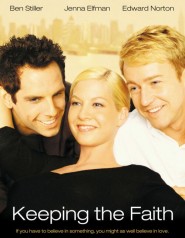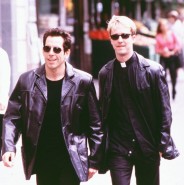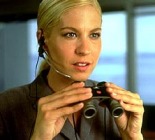|
Keeping the Faith
|
| |
 |
USA,
2000. Rated PG-13. 120 minutes
Cast: Ben Stiller, Edward Norton,
Jenna Elfman, Anne Bancroft, Eli Wallach, Milos Forman, Ron Rifkin, Holland
Taylor, Lisa Edelstein, Rena Sofer, Brian George
Writer: Stuart Blumberg
Music: Elmer Bernstein
Cinematographer: Anastas N. Michos
Producers: Howard "Hawk" Koch Jr, Edward Norton, Stuart
Blumberg
Director: Edward Norton
|
 fter
career-launching bad-boy roles in movies like American
History X and Fight Club, Edward
Norton reverses course with a sweet, unexpectedly thoughtful, and decidedly
un-edgy romantic comedy about two best friends who fall for the same girl–an
unexpected choice for Norton's directorial debut. Unlike the resolutely forward-looking,
generation-defining Fight Club, Keeping the Faith is an intentional homage
to the classic Howard Hawks screwball comedies of Hollywood's Golden Age. The
lack of sharp pacing or a tight story, essential elements of Hawks' classics,
prevents Keeping the Faith from fully succeeding, but it's still an engaging
effort that bears little resemblance to the theatrical trailer, which advertised
Keeping the Faith as a breezy, Brothers Farrelly-esque farce.
fter
career-launching bad-boy roles in movies like American
History X and Fight Club, Edward
Norton reverses course with a sweet, unexpectedly thoughtful, and decidedly
un-edgy romantic comedy about two best friends who fall for the same girl–an
unexpected choice for Norton's directorial debut. Unlike the resolutely forward-looking,
generation-defining Fight Club, Keeping the Faith is an intentional homage
to the classic Howard Hawks screwball comedies of Hollywood's Golden Age. The
lack of sharp pacing or a tight story, essential elements of Hawks' classics,
prevents Keeping the Faith from fully succeeding, but it's still an engaging
effort that bears little resemblance to the theatrical trailer, which advertised
Keeping the Faith as a breezy, Brothers Farrelly-esque farce.
Norton and screenwriter Stuart Blumberg, Norton's classmate at Yale, open the
film with a young man (Norton), who is inebriated in the exaggerated and unrealistic
way that movie characters are always inebriated, stumbling into a Manhattan
bar and spilling his guts to a sympathetic bartender (Brian George). It seems
that Norton's character, Brian, is on the wrong corner of a love triangle. "I
think I've heard this one before," objects the bartender as Brian is about launch
into his tale of woe. Ah, but this is a triangle with a twist: Brian is a priest,
and his best friend Jake (Ben Stiller) is a rabbi. 
Brian's story begins with some weak character-establishing slapstick that show
Brian and Jake adjusting to religious life. Jake faints at a bris; Brian lights
his robes on fire with a censer. After these early scenes, Keeping the Faith
picks up steam when childhood friend Anna (Jenna Elfman) re-enters Jake and
Brian's lives. Both find the no-nonsense businesswoman to be discombobulatingly
attractive and fall head over heels, despite Brian's vow of chastity and Jake's
de facto proscription against dating a gentile. Keeping the Faith
resists criticizing either character's religion, however. Quite the contrary:
in its more serious moments, the film is a meditation on faith that asks whether
being in love with God and being in love with a person can be reconciled.
Keeping the Faith sustains momentum until the story returns to Brian
at the bar. After that, Keeping the Faith fails to maintain the crackle
and spark that characterizes the middle of the film. The script has many stretches
of originality and eloquence (one favorite: Brian's sermon on the difference
between religion and faith), but Blumberg (whom you'll spot playing one of Anna's
co-workers, and you'll also see his name on a sign at the airport) runs out
of ideas. He falls back on every romantic comedy cliche in the handbook. [Very
minor spoilers follow here, and they are spoilers only if you've never seen
a Hollywood romantic comedy before:] Of course the boy has to rush
to catch the girl before she hops on a plane and leaves town. Of course
an unexpected impediment makes catching the girl difficult. Of course
the boy is forced to make his heartfelt appeal in public, in front of a million
witnesses. Keeping the Faith doesn't even attempt an original spin, like
Notting Hill did a year ago, in which Hugh Grant wound up expressing
his feelings through the questions he poses to Julia Roberts at a press conference.
The last act of Keeping the Faith plays strictly by the numbers, counting
out its time until the final credits.
AboutFilm.Com
The Big Picture
|
| Alison |
-
|
| Carlo |
B-
|
| Dana |
-
|
| Jeff |
C+
|
| Kris |
B+
|
Sluggish pacing compounds the problems of the final act. Keeping the Faith
clocks in at two hours and ten minutes, which is long for a romantic comedy.
Length is not in itself a problem, but there's one too many heartfelt speeches
at the end, and the sloppy musical montage in the middle could also have been
cut. It is too-obviously a collage of footage from scenes that were dropped,
but that the editors couldn't bear to throw away entirely.
Despite its inconsistency and disappointing conclusion, Keeping the Faith
has considerable charm. It has charm for two reasons. First, it is disarmingly
earnest and un-self-conscious. Norton has said (in an interview with the San
Francisco Chronicle) that the intent of the film is to take romantic comedy
back to where it was before Annie Hall, free of irony and the sort of
defensive comedic detachment that is, Norton feels, so much the hallmark of
modern films dealing with emotional issues and vulnerability. Keeping the
Faith succeeds in doing this, but it's also quite contemporary, not in a
good way, with its shopworn speechifying and standard romantic comedy devices
at the end.
Second, Keeping the Faith has charm because the actors have charm. They
are the film's finest asset. Ben Stiller transits smoothly between the serious
and the farcical, and is funniest (as always) when participating in jokes at
his own expense, particularly ones that mock his small size. Stiller is not
quite believable as Rabbi Jake the Jewish Babe Magnet, but this is a problem
barely worth mentioning, as Keeping the Faith doesn't strive for literal
believability. It even departs from reality occasionally with absurd details
like Jake's "Heroes of the Torah" trading cards. 
Elfman's Anna, a driven woman with an intimate relationship with her cell phone,
is the most visible reflection of Hawks' classic screwballs. Like Katharine
Hepburn's Susan in Bringing Up Baby or Rosalind Russell's Hildy in His
Girl Friday, Anna dominates every scene she's in. The script is designed
that way. Appropriately, Elfman projects far more strength than the men around
her. Her entrance into the movie–she steps off a plane, lowers her shades, and
purrs, "Hello, boys"–is worthy of Hawks. Viewers used to her kooky Dharma on
ABC's Dharma and Greg may be as surprised as Faith's producers
(Norton, Blumberg, and Primal Fear
executive producer Howard "Hawk" Koch, Jr.) reportedly were. Apparently, Elfman
was not under strong consideration for the role, but she made such an impression
at her audition that they hired her almost on the spot. Her comic timing is
impeccable.
As Brian, Norton proves what had already been suggested by his performance
in Fight Club–that his comedic talents match his dramatic abilities.
It's been said that his acting style is reminiscent of a young Dustin Hoffman.
It certainly seems so in Keeping the Faith, perhaps because there are
other reminders of Hoffman in the movie. Hoffman's co-star in The Graduate,
Anne Bancroft, is in the movie (as Jake's mother), and, in one of the wittiest
scenes, Norton imitates Hoffman's Rain Man.
So what can be said about Norton's debut as a director? There's nothing too
distinctive about the direction, which is probably a good thing. In a character
and dialogue-driven movie such as Keeping the Faith, the director shouldn't
be showing off. The fact that Norton's style is restrained itself suggests that
he knows what he's doing, but we'll have to wait until he helms a couple more
films before we can draw conclusions about him as an artist behind the camera.
His first effort, however, is a promising one.
Review
© May 2000 by AboutFilm.Com and the author.
Images © 2000
Touchstone Pictures. All Rights Reserved.



